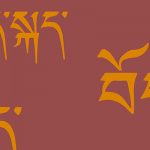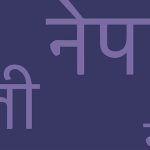The UBC Himalaya Program has been offering community-engaged Nepali and Tibetan language courses since 2016, progressively evolving from 1-week, 1-credit courses to 2-week, 3-credit courses for the seventh consecutive year as of summer 2024. This year’s TIBT 390 course ran daily from Monday to Friday between May 13th – May 24th, 2024, while NEPL 390 ran daily from Monday to Friday between July 2nd – July 12th.
In addition to classroom instruction with professors Mr. Sonam Chusang (Tibetan) and Mr. Binod Shrestha (Nepali), students practiced language skills and gained intercultural experiences through community engagement activities with members of the Tibetan and Nepali communities of British Columbia.


TIBETAN 2024
Taught by Mr. Sonam Chusang
Off-Campus Visits
The Tibetan class this year continued its tradition of off-campus field trips, which allowed students not only to practice their newly acquired language skills but also to gain insights into the Tibetan spaces and experiences in Vancouver.
On May 17th, students held a picnic outside IKB Building where they had the chance to practice language skills by interacting with Tibetan community members in small groups, furthering their understanding of the local Tibetan community.

Students practicing greetings and asking questions in Tibetan with community members.
|
|
A group picture from the picnic…
To conclude the course, the class visited Tsengdok Monastery in central Vancouver on 24th May for a full day of immersive activities. The students participated in a traditional ceremony, learned how to prepare Tibetan dumplings, or momos, and learned about compassion from one of the renowned Geshes [monastic teacher] from the Monastery. After dinner, the students performed the Tibetan song “This Is Home” for an audience of monks and community members.

Students making Tibetan dumplings, momo, with community members.

Students eating momo and connecting with the community members during dinner.
|
|
Class Experience
The 2024 Tibetan course provided students with a comprehensive introduction to the Tibetan script, sound system, grammar and basic vocabulary, bolstered by community engagement activities.
|
|
In this year’s Tibetan language class, the students represented a diverse spectrum of proficiency levels. Some had exposure to Tibetan in the previous winter term, while others were completely new to the language. In response to this wide array of abilities, Teacher Sonam Chusang implemented a variety of group-based interactive activities. These activities serve a dual purpose – they allow the more advanced students to mentor newcomers and reinforce their own grasp of Tibetan, while also providing an engaging and supportive learning environment for the beginners. The new students particularly appreciate this interactive method, as it assists them in integrating more seamlessly into the class, and they also benefit from the shared experiences of their peers who are also navigating the complexities of learning Tibetan as an additional language. The outcome of this collaborative approach to learning has been profoundly positive, with all students achieving new strides in language proficiency.
Class Visits
Throughout the course, Tibetan and Tibetan-speaking community members visited the class, sharing different aspects of Tibetan culture from firsthand experience. This included visits by Lama Rabten from Nalanbodhi Foundation, Professor Tsering Shakya who spoke about the Tibetan diaspora, and artists Acha Tsering and Acha Yangkyi from Lhaksam Metok Tibetan Song & Dance Group.

Student learning the Tibetan song ‘This is Home’ with members of Lhaksam Metok.

Lama Rabten gives a lecture about social media and mindfulness and leads the class through a short meditation session.
 NEPALI 2024
NEPALI 2024

Taught by Mr. Binod Shrestha
Off-Campus Visits
On July 12th, students had the enriching opportunity to visit the Thrangu Monastery in Richmond. There, Lama Sangpo delivered a lecture on the foundations of Buddhism and provided insights into Nepali religious practices. Following a comprehensive tour of the monastery, students were split into different groups, with each group engaging with a Nepali monk to practice their conversational skills. The students asked questions about the Nepali monks’ daily religious training, life as a Buddhist monk, and how they traveled to Canada from their homeland. The monastery also provided a delicious vegetarian lunch for everyone after their oral assignments. Before departing, students presented khatags [white silk offering scarves] to the monks as a gesture of respect.
A group picture taken in the Thrangu Monastery shrine hall during the Nepali class field trip.
 Divided into smaller groups, students interacted with monks from Nepal in the monastery to hone their basic conversational abilities.
Divided into smaller groups, students interacted with monks from Nepal in the monastery to hone their basic conversational abilities.
|
|
|
|
Class Experience
Professor Binod Shrestha incorporated online tools such as Quizlet and Kahoot to enhance the learning experience for students. Along with teaching the language, Professor Shrestha also interwove elements of Nepali culture related to their studies. He curated numerous interactive activities, enabling students to converse in Nepali amongst themselves. This approach of peer learning allowed students of varied backgrounds to benefit from each other’s insights. By the course’s conclusion, students had acquired a foundational Nepali vocabulary and could engage in basic conversations and interact with native Nepali speakers using straightforward sentences.
“The most rewarding part of the day for me was engaging in Nepali conversations with my friends and seeing them slowly improve in learning vocabulary and pronunciation.”
“The Quizlet flashcards were especially helpful in allowing us to test ourselves and identify areas where we needed improvement.”
“The most rewarding part of the day was testing my possessive verb knowledge in Kahoot and the most challenging part of the day was getting comfortable understanding the difference between inflective and invariable adjectives.”
Classroom Visits
On July 9th, Professor Mark Turin and Professor Sara Shneiderman from UBC and the Himalaya Program Steering Committee visited the class. While Professor Turin discussed his experiences learning Nepali in Nepal, Professor Sara Shneiderman spoke about an article she co-authored with Ramjee Parajulee and Ratna Shrestha that explored dynamics of the Nepali diaspora in BC.

Sara and Mark discussing their experiences and knowledge in Nepali language and culture.
|
|
To receive up-to-date information about our courses and programs, please sign up for our mailing list.
These courses are supported by the Department of Asian Studies, UBC Faculty of Arts, the Teaching and Learning Enhancement Fund (TLEF), the Centre for Community Engaged Learning (CCEL), the School of Public Policy & Global Affairs / Institute of Asian Research, and UBC Go Global.
